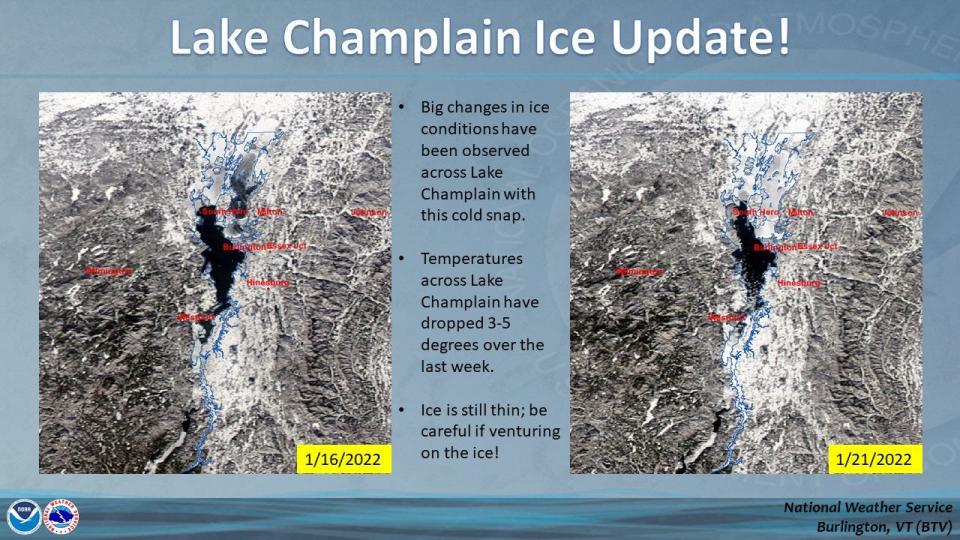Lake Champlain ice is growing quickly. What are the chances of a full freeze over?
Recent below-normal temperatures in Vermont have created prime conditions for ice to form on Lake Champlain, according to the National Weather Service in Burlington.
While the center of the lake has not yet frozen over, recent satellite images shared by the National Weather Service show that ice is growing quickly. But, meteorologist Andrea LaRocca said she estimates that less than 50% of the lake was actually frozen as of Jan. 24.
The lake has only frozen over a handful of times in the last 10 years: in 2014, 2015 and 2019.
The most likely months that the lake could freeze over would be January or February, though ice closure has occurred in March as well, LaRocca said.
Watch ice progress from 2019: Lake Champlain freezes over and thaws

Lake Champlain freezing over is possible every winter, but certain conditions must exist to make it occur, LaRocca said. Colder-than-normal temperatures coupled with a light breeze — especially on nights when temperatures drop below zero — are prime conditions for ice formation.
Know before you go: Is the ice safe to walk on? What Vermonters should know about frozen lakes and ponds.
These conditions have occurred in Vermont recently, but LaRocca said the weather pattern would need to continue. Heavier winds during colder temperatures, on the other hand, would not help ice formation as they more often cause waves in the lake that break up the ice.
It's not often we get 3 consecutive days of clear skies in January. Here is a loop of the ice coverage change on Lake Champlain over the past 3 days. There has been a lot of new ice growth and this growth will continue through at least the next week. pic.twitter.com/WElOOy0B79
— NWS Burlington (@NWSBurlington) January 23, 2022
So how likely is it that the lake will freeze over? LaRocca said it's difficult to predict.
"I can't speak exactly to the likelihood of it, other than just the conditions that we would need," LaRocca said. "I will say, it looks like the next six to 10 days moving forward do look below normal, so will continue to produce more ice on the lake."
December lake forecast: Lake Champlain water temperatures dip toward freezing — but will it freeze over?
But, she said, temperatures may warm back up at the beginning of February.
"The question is how long will that persist and how much ice are we going to be able to produce before that happens?" LaRocca said.

In the meantime, people should be careful if they venture out onto the ice on Lake Champlain, LaRocca said. She said the ice still appears to be really thin in recent photos she has seen on social media.
Related: Snowmobile season has finally begun along Vermont's 5,000 miles of trails
"If you don't know what the ice thickness is, don't venture out on the ice," LaRocca said.
Contact Elizabeth Murray at 802-310-8585 or emurray@freepressmedia.com. Follow her on Twitter at @LizMurrayBFP.
This article originally appeared on Burlington Free Press: Ice is quickly covering Lake Champlain. NWS freeze over forecast

